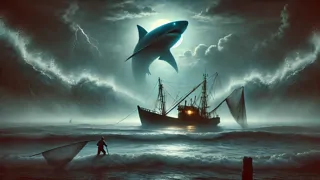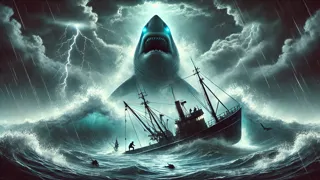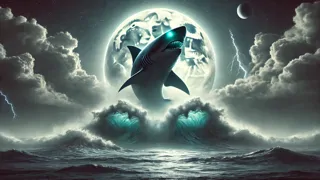Introduction
On the rugged coastline of Maine, where fishermen rise before dawn, the sea holds mysteries older than memory. Early each morning, small boats drift out across glassy waters under a sky painted with violet and gold, nets ready for the day’s catch. The men pray for calm seas and bounty, but they also speak in hushed tones of a guardian who watches below the waves. They call him the Shark God, a power older than any storm, whose massive form can rise from deep currents like a living mountain of muscle and bone. According to local legend, he tests the hearts of those who venture beyond the break, offering protection to the humble and wrath to the cruel. Stories tell of greedy captains lost to monstrous swells after refusing to share their catch with starving neighbors. Others recall miraculous storms that vanished without warning, saving boats at the very edge of disaster. Each tale carries the same message: honor the sea, respect its gifts, and the Shark God will stand between man and ruin. Fail in your duty, and his jaws will find you in the darkness beneath. This story explores the living legend on these shores, tracing its origins among fishermen’s wives, the silent prayers cast into salty winds, and the challenges that brought this deity into human lore. It is a journey into a world where faith and fear swim together, where the whisper of fins can mean salvation or doom, and where justice flows like the tides. Prepare to dive beneath the surface and discover how the Shark God shaped the lives of those who dared to meet him, whether in blessing or in wrath.
Origins of the Shark God
Long ago, when the sea was an untamed frontier, the first fishermen of Cape Ann faced endless uncertainty. They carved sturdy vessels from oak and elm, learned to read shifting currents, and braved winds that howled through every crack. On certain nights, when lanterns bobbed across the waters, strange shapes moved beneath the hulls—vast silhouettes slipping silently beneath the moonlight. The elders spoke of a creature so immense it reshaped the very waves it traversed, glinting with ancient power like the heart of a storm. To honor the unseen, fishermen laid offerings of fresh catch at the water’s edge, words spoken into the dark heaved into the surf. Word of those sacrifices spread among coastal hamlets, weaving a thread of belief that tied each soul to the ocean’s unpredictable mercy. In the flickering glow of dawn, some claimed they saw fin tips slicing the foam like blades, an omen of favor or ruin. Mothers hushed restless children with stories of a protector who guarded honest toil, and punishments that befell those who took without thought. Over time, priests of small shrines carved shark teeth into wood, symbols of a god both merciful and merciless.

Archaeologists in the region later uncovered weathered talismans carved in shark form, buried beneath dunes at sites once used for ritual gatherings. Each pendant bore markings resembling swirling currents and razor edges, as if echoing the deity’s fierce aspect. Scholars debated whether these artifacts belonged to a lost native tribe or emerged from the artisans of early settlers, blending traditions from both the Old World and the New. Regardless of origin, the symbols all carried the same message: respect the sea’s abundance, or face a power beyond mortal control. Generations passed, and tales grew richer. Chroniclers noted storms that parted at sea leaving unharmed small fleets, attributing miracles to the guardian of cold waters. It became common practice to name newborns after the deity of the deep, a gesture of devotion meant to ensure safe voyages and plentiful nets.
Over centuries, the Shark God’s story evolved with each retelling. Colonial captains insisted they saw a colossal fin breach just beyond cast nets when they honored old customs. Folklore blended with fact as journals recorded both miraculous rescues and brutal shipwrecks blamed on those who defiled the ocean’s balance. By the time steam-powered vessels replaced wooden sloops, the deity’s legend had spread along every New England port. Fishermen carried charms into modern harbors, and fishermen’s wives kept small tokens on mantels, praying the spirit would smile on their husbands at sea. Even today, when sonar crews detect unexplained shapes deep beneath the surface, whispers remind us that the deity watches still, waiting for signs of devotion or betrayal in the heart of every mariner.
Trials at Sea
At the start of one harsh autumn, a crew of six fishermen set out into churning waters, determined to bring home a record haul before winter froze the bays. Heavy clouds blurred the horizon as the schooner creaked over rising swells. Tensions ran high when nets came empty, and the cold seeped into bones as each haul returned near barren. One night, as lantern light flickered against the hull, the lookout cried out at a dark presence slipping below the surface. The men froze, nets slipping from numb fingers, hearts hammering. From the depths, the Shark God’s silhouette emerged, larger than any beast they had ever known. Silence dominated until the deity’s roar rolled through the ocean like thunder. They sensed both a warning and a promise, and with trembling hands they cast fish into yawning waters as an offering of peace. In that moment, the sky split with lightning, and the sea calmed to a gentle sway, guiding the crew home unharmed.

The next spring, rumors reached neighboring villages of a merchant vessel that skimmed nets too close to breeding grounds, scooping thousands of young fish. The captain boasted he would outrun any storm to meet his deadline, ignoring old songs warning of greed’s consequence. That night, crews reported thunderous strikes against the hull as monstrous fins carved the water in pulsating patterns. A fierce gale rose without warning, and by dawn, the wreckage drifted on calm tides, the merchant long gone. Fishermen spoke in hushed tones of teeth marks gouging timber, a divine punishment etched into the wreck. Though the cargo held different species, the sea offered no mercy to overreach. Elders reminded all that balance must be maintained, and that the deity rewarded humility over hubris. Those who had glimpsed the event described eyes glowing like embers beneath foam, a silent verdict passed from the abyss. The tale spread swiftly, a stark lesson that no man could borrow the ocean’s gifts without honoring its unseen guardian.
Even those who respected the old ways experienced trials when the Shark God chose to test their devotion. In one tale, a lone fisherman named Jonas defied warnings by steering into forbidden reefs rumored to be the deity’s threshold. As the vessel drifted near jagged rocks, currents shifted unexpectedly, pulling the boat toward a jagged outcrop. Jonas cried out in despair, but instead of crashing upon stones, the hull floated away on an invisible wave guided by unseen hands. Moments later, a massive silhouette swept beneath, nudging the craft back toward open water. The sea grew calm, and Jonas vowed to speak only with reverence of the power below. His hymn of gratitude carried on winds and became the cornerstone of the coastal rite that persists today.
Judgment and Mercy
In modern times, the Shark God’s influence endures in rituals more subtle but no less sincere. Fishermen oil their nets with tallow at sunrise, whispering invocations taught by elders. Children gather shell fragments near tide pools, leaving offerings of sea glass, hoping to earn safe passage for future ventures. Even scientists studying migratory patterns record strange sonar blips and unexplained safe harbors, phenomena they cannot fully explain. Biologists debate natural currents, but locals insist on a deeper force. They recall how storms diverted at the right moment or how nests of rare species escaped dredging nets on unusually calm nights. Each anomaly rekindles the legend of a deity who balances scales of justice beneath rolling swells. In harbored coves, simple shrines of driftwood and shark jaws remain, marking places where mortal and divine meet in fragile peace. With every net cast and every prayer uttered into salt-laden air, the community acknowledges that true wealth lies not in plunder but in respect for the life that sustains them.

But the Shark God’s mercy has limits. In recent decades, stories surfaced of poachers seeking rare specimens in protected waters—trawlers silent beneath starless skies, nets dragging juvenile sharks and rays toward decks. Local watch captains reported radio silence as if the air itself was devoured by invisible jaws. When authorities arrived at dawn, the equipment lay scattered, the hull scarred by deep grooves and streaks of crimson foam, but no soul remained aboard. Investigations attributed the incident to foul play, yet no criminals were ever convicted. Some claim the Shark God delivered justice when earthly courts failed.
Today, the coastal parable thrives in art and song. Murals on harbor walls depict a great shark leaping against a storm-tossed sea, nets spilling fish in homage. Folk bands compose ballads in minor keys, weaving accounts of salvations and shipwrecks, cautionary tales that remind each generation of the fragile covenant between man and ocean. Tourists buy hand-carved tridents tipped with shark jaw, unaware that the likeness they wear is also a pact: to honor a power far older than any vessel or lighthouse. When night falls and the moon turns silver on dark water, the community gathers at low tide for a ritual—silence for reflection, offerings for gratitude, and whispers of blessing for tomorrow’s journeys.
Conclusion
After countless dawns and dusks, the legend of the Shark God endures because it speaks to our deepest needs: the desire for protection, the warning against greed, and the comfort of unseen guardianship. It reminds fishermen and shore dwellers alike that the ocean is not a resource to dominate but a living realm to respect. In each generation, the Shark God appears in new forms—whether in trembling sonar readings, whispered confessions in harbor bars, or the steady faith of those who release a small fish back into the dark. By honoring rituals both ancient and evolving, coastal communities maintain a bond with forces beyond human control. When nets are cast tomorrow, and the salt air fills lungs once more, remember the stories of mercy and judgment buried beneath every wave. Let every act of humility be an anchor for hope, ensuring that the Shark God’s watchful eyes remain our steadfast allies on the rolling waters of life.


















